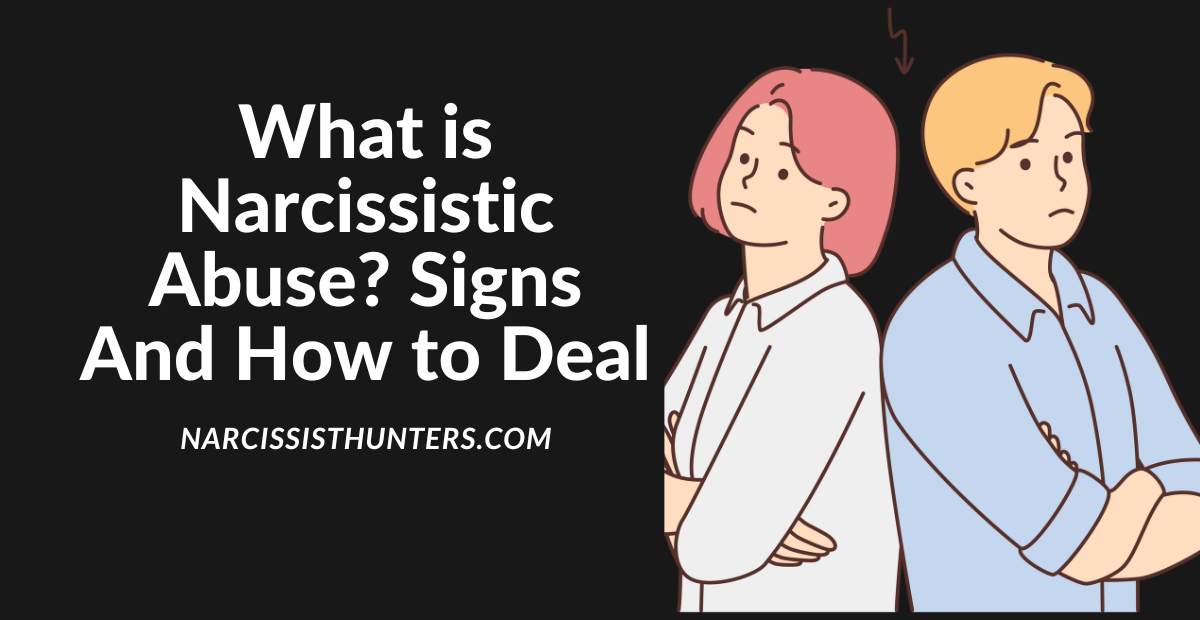Narcissistic abuse is a type of abuse that can hurt your feelings and your mental health. It happens when someone who is very self-centered tries to control and trick you. They can do it in many different ways, like by being mean to you or by making you feel like you’re going crazy.
In this blog post, I will talk about the types of narcissistic abuse, What is narcissistic abuse, Examples of narcissistic abuse, Effects of narcissistic abuse and how to deal with it.
What is Narcissistic Abuse?
Narcissistic abuse is a form of psychological abuse where a person with narcissistic personality traits (Narcissism) or a diagnosed narcissistic personality disorder uses manipulative and controlling behaviors to harm and exploit their victim. It can take many forms, including emotional and verbal abuse, gaslighting, financial abuse, and more.
Signs of Narcissistic abuse

Here are ten signs of narcissistic abuse to watch out for:
- Belittling and criticism: A narcissistic abuser may frequently criticize and belittle their victim, often in public or in front of others.
- Gaslighting: This is a form of psychological manipulation where the abuser tries to make the victim doubt their own reality, often by denying things they’ve said or done or by blaming them for things they didn’t do.
- Blame-shifting: The abuser may refuse to take responsibility for their own actions and instead blame their victim for their own mistakes or shortcomings.
- Controlling behavior: Narcissistic abusers often try to control their victim’s behavior, decisions, and relationships, and may use intimidation, threats, or emotional manipulation to do so.
- Emotional blackmail: The abuser may try to make the victim feel guilty or ashamed for not meeting their demands or expectations, or for not conforming to their idea of how the victim should behave.
- Isolation: The abuser may try to isolate the victim from their friends, family, and support networks, and may try to make the victim dependent on them for their emotional and financial needs.
- Double standards: The abuser may hold the victim to different standards than they hold themselves, and may not follow the same rules they expect the victim to follow.
- Grandiosity: The abuser may have an exaggerated sense of self-importance and may expect special treatment or recognition from others.
- Lack of empathy: The abuser may be unable or unwilling to understand or consider the feelings and needs of others, including their victim.
- Mood swings: The abuser may have sudden mood swings or explosive outbursts, often in response to perceived slights or criticisms.
Examples of Narcissistic abuse
Here are five examples of narcissistic abuse:
- Verbal and emotional abuse: A narcissistic abuser may use harsh language, yelling, name-calling, or insults to demean and control their victim. They may also use emotional manipulation, such as guilt-tripping or gaslighting, to undermine their victim’s sense of self and reality.
- Financial abuse: The abuser may control their victim’s finances, withholding money, restricting access to bank accounts, or forcing the victim to hand over their income. This can leave the victim financially dependent on the abuser and make it difficult for them to leave the relationship.
- Isolation: The abuser may try to isolate the victim from their friends and family, limiting their social support network and leaving them vulnerable to the abuser’s control.
- Physical and sexual abuse: Narcissistic abusers may use physical violence or coercion, including sexual violence or rape, to control and intimidate their victim.
- Neglect and abandonment: In some cases, narcissistic abusers may neglect their victim’s needs, including physical and emotional needs, or abandon them altogether, leaving them feeling alone and vulnerable.
Effects of Narcissistic abuse

Here are ten common effects of narcissistic abuse:
- Low self-esteem: Narcissistic abuse can undermine the victim’s sense of self-worth and confidence, leaving them feeling powerless and helpless.
- Anxiety: Victims of narcissistic abuse may experience anxiety, fear, or panic attacks as a result of the abuse.
- Depression: Narcissistic abuse can lead to feelings of sadness, hopelessness, and despair, and may contribute to the development of clinical depression.
- Post-traumatic stress disorder (PTSD): Some victims of narcissistic abuse may develop PTSD, a condition characterized by flashbacks, nightmares, and other symptoms of trauma.
- Self-blame: Victims of narcissistic abuse may blame themselves for the abuse or feel guilty or ashamed, even though the abuse is not their fault.
- Confusion and self-doubt: The abuser’s gaslighting and other manipulative tactics can leave the victim feeling confused and unsure of their own reality.
- Trust issues: Victims of narcissistic abuse may struggle to trust others, particularly in intimate or vulnerable relationships.
- Social isolation: Narcissistic abuse can lead to social isolation, as the victim may be cut off from friends, family, and other support networks.
- Physical symptoms: The stress and trauma of narcissistic abuse can manifest in physical symptoms, such as headaches, gastrointestinal problems, and chronic pain.
- Fear of intimacy: Victims of narcissistic abuse may develop a fear of intimacy or avoid relationships altogether, as they may associate relationships with pain and abuse.
Narcissistic abuse Cycle
The narcissistic abuse cycle refers to the pattern of behavior that is often seen in relationships where one partner has narcissistic personality disorder. This cycle typically involves four stages:
- Idealization: In the idealization stage, the narcissistic partner appears charming, attentive, and loving. They shower their partner with attention and affection, making them feel special and valued. This stage is often described as the “honeymoon phase” of the relationship.
- Devaluation: In the devaluation stage, the narcissistic partner begins to criticize and belittle their partner. They may become distant, withdraw affection, and engage in manipulative behaviors such as gaslighting and blaming. This stage is often marked by conflict and tension in the relationship.
- Discard: In the discard stage, the narcissistic partner may abruptly end the relationship or withdraw emotionally, leaving their partner feeling confused, hurt, and rejected. They may also engage in further manipulation, such as triangulation, to keep their partner hooked and feeling desperate for their attention.
- Hoovering: In the hoovering stage, the narcissistic partner may attempt to rekindle the relationship by returning to the idealization phase. They may apologize, offer gifts or compliments, and try to win back their partner’s trust and affection. This stage can be particularly confusing for the victim, as it may make them question their own feelings and experiences in the relationship.
How to deal with Narcissistic abuse?
Dealing with narcissistic abuse can be incredibly challenging, but there are some practical steps that can help you protect yourself and heal. Here are five ways to deal with narcissistic abuse:
A. Establish and enforce boundaries
Setting clear boundaries is key when dealing with a narcissistic partner. This means communicating your needs and expectations clearly, and being prepared to walk away if those boundaries are violated.
It can be helpful to have a trusted friend or therapist to help you establish and enforce these boundaries.
Practice self-care: Narcissistic abuse can take a toll on your mental and physical health, so it’s important to take care of yourself.
This might involve activities like exercise, meditation, spending time in nature, or pursuing a hobby that brings you joy.
B. Seek support
Narcissistic abuse can make you feel isolated and alone, so it’s important to seek out support from friends, family, or a therapist. Support groups for survivors of narcissistic abuse can also be a helpful resource.
C. Educate yourself
Learning about narcissistic personality disorder and the tactics used in narcissistic abuse can help you better understand what you are dealing with and develop effective strategies for coping.
D. Consider leaving the relationship
In some cases, leaving the relationship may be the best option for protecting yourself from further abuse.
This can be a difficult decision to make, and it may be helpful to work with a therapist or counselor to explore your options and develop a safety plan.
Frequently Asked Questions
- What do Narcissists do their victims?
Narcissists use tactics such as gaslighting, blame-shifting, emotional manipulation, and control to exploit and harm their victims.
2. How do victims of narcissistic abuse behave?
Victims of narcissistic abuse may experience symptoms such as anxiety, depression, low self-esteem, self-doubt, and a sense of worthlessness.
They may also struggle with setting boundaries and may have difficulty trusting others. In some cases, victims may develop post-traumatic stress disorder (PTSD) as a result of the abuse.
3. What happens to your brain after narcissistic abuse?
Narcissistic abuse can cause changes in the brain, including increased activity in the amygdala (the fear center of the brain), decreased activity in the prefrontal cortex (the decision-making center), and changes in the brain’s reward system. These changes can lead to symptoms such as anxiety, depression, and difficulty regulating emotions.
4. How narcissistic abuse affects future relationships?
Narcissistic abuse can affect future relationships by causing trust issues, difficulty with intimacy and vulnerability, and a heightened sensitivity to signs of manipulation or control.
Victims may also struggle with setting boundaries and may attract similar types of people in future relationships. However, with therapy and support, it is possible to heal and form healthy relationships.
Last words
In conclusion, narcissistic abuse is a form of emotional and psychological abuse that can be difficult to identify and even more challenging to escape. It involves a cycle of idealization, devaluation, discard, and hoovering that erodes a person’s self-esteem and sense of self-worth. It’s essential to recognize the signs of narcissistic abuse and seek help from trusted friends, family, or professionals if you are experiencing it.
Establishing and enforcing boundaries, practicing self-care, seeking support, educating yourself, and, in some cases, leaving the relationship are all essential steps in dealing with narcissistic abuse.
Remember that healing is possible, and recovery is achievable with the right support and resources. By taking these steps, you can protect yourself, rebuild your sense of self-worth, and move forward into a healthy, happy future.
